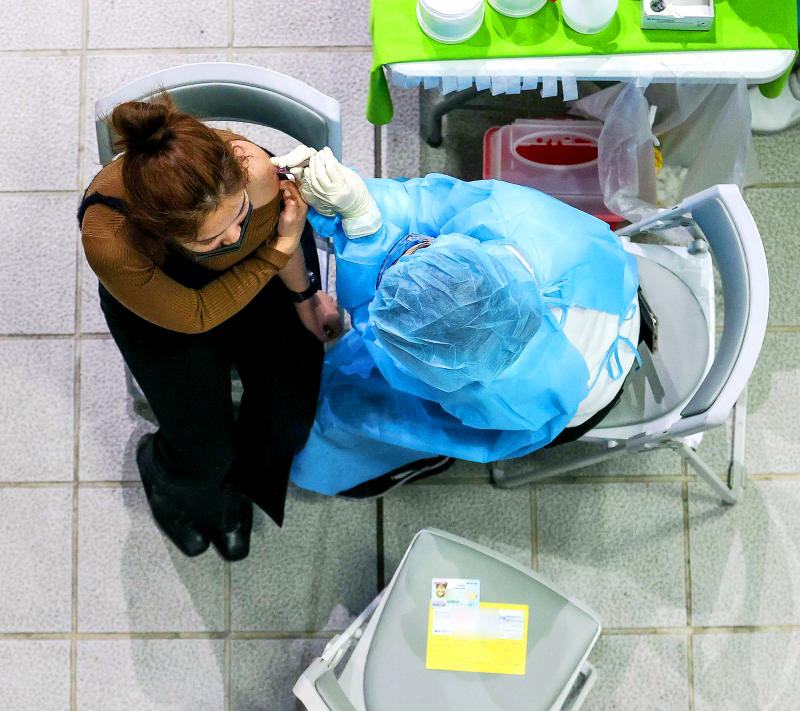The locally developed Medigen COVID-19 vaccine has successfully completed a phase 3 clinical trial in Paraguay and received emergency use authorization (EUA) from the South American nation.
The Taiwanese vaccine manufactured by Medigen Vaccine Biologics Corp (高端疫苗) was hailed by Taiwanese experts as an important milestone for domestically produced vaccines.
Medigen’s vaccine has been gaining recognition from international institutions. It has been included in the WHO’s Solidarity Trial Vaccines program and received a US$2.3 million grant from the Coalition for Epidemic Preparedness Innovations to conduct a mix-and-match trial.

Photo: CNA
A double-blind, randomized study was used in the clinical trial in Paraguay to compare Medigen’s vaccine with that made by AstraZeneca, Taiwan Immunization Vision and Strategy (台灣疫苗推動協會) chairman Huang Yu-cheng (黃玉成) said.
The results of the trial were similar to data collected from the phase 2 trial conducted in Taiwan.
Infectious-disease expert Lee Ping-ing (李秉穎) said that he was not surprised by the results and believes that Medigen’s vaccine would be approved by more nations.
Lee said that he hoped Taiwanese vaccines would no longer be politicized, but be generally accepted by Taiwanese.
Medigen is now waiting for the results of the WHO’s Solidarity Trial Vaccines clinical study, which evaluates the effectiveness of vaccines from around the world.
If the trial proceeds as scheduled, the results are expected by the end of next month or in early April, Medigen chief executive officer Charles Chen (陳燦堅) said.
The company already has capacity to manufacture more than 100 million doses in preparation for a shift from domestic to international markets, he said.
The pandemic has offered an opportunity for domestic manufacturers to develop vaccines and for Academia Sinica to improve its mRNA-related technologies, Huang said.
The experience gained and the growth in research and development would hopefully lead to quicker responses to future pandemics, he said.
Additional reporting by CNA

MAKING WAVES: China’s maritime militia could become a nontraditional threat in war, clogging up shipping lanes to prevent US or Japanese intervention, a report said About 1,900 Chinese ships flying flags of convenience and fishing vessels that participated in China’s military exercises around Taiwan last month and in January have been listed for monitoring, Coast Guard Administration (CGA) Deputy Director-General Hsieh Ching-chin (謝慶欽) said yesterday. Following amendments to the Commercial Port Act (商港法) and the Law of Ships (船舶法) last month, the CGA can designate possible berthing areas or deny ports of call for vessels suspected of loitering around areas where undersea cables can be accessed, Oceans Affairs Council Minister Kuan Bi-ling (管碧玲) said. The list of suspected ships, originally 300, had risen to about 1,900 as

DAREDEVIL: Honnold said it had always been a dream of his to climb Taipei 101, while a Netflix producer said the skyscraper was ‘a real icon of this country’ US climber Alex Honnold yesterday took on Taiwan’s tallest building, becoming the first person to scale Taipei 101 without a rope, harness or safety net. Hundreds of spectators gathered at the base of the 101-story skyscraper to watch Honnold, 40, embark on his daredevil feat, which was also broadcast live on Netflix. Dressed in a red T-shirt and yellow custom-made climbing shoes, Honnold swiftly moved up the southeast face of the glass and steel building. At one point, he stepped onto a platform midway up to wave down at fans and onlookers who were taking photos. People watching from inside

Japan’s strategic alliance with the US would collapse if Tokyo were to turn away from a conflict in Taiwan, Japanese Prime Minister Sanae Takaichi said yesterday, but distanced herself from previous comments that suggested a possible military response in such an event. Takaichi expressed her latest views on a nationally broadcast TV program late on Monday, where an opposition party leader criticized her for igniting tensions with China with the earlier remarks. Ties between Japan and China have sunk to the worst level in years after Takaichi said in November that a hypothetical Chinese attack on Taiwan could bring about a Japanese

The WHO ignored early COVID-19 warnings from Taiwan, US Deputy Secretary of Health and Human Services Jim O’Neill said on Friday, as part of justification for Washington withdrawing from the global health body. US Secretary of State Marco Rubio on Thursday said that the US was pulling out of the UN agency, as it failed to fulfill its responsibilities during the COVID-19 pandemic. The WHO “ignored early COVID warnings from Taiwan in 2019 by pretending Taiwan did not exist, O’Neill wrote on X on Friday, Taiwan time. “It ignored rigorous science and promoted lockdowns.” The US will “continue international coordination on infectious